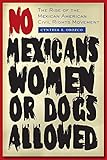No Mexicans, Women, or Dogs Allowed : The Rise of the Mexican American Civil Rights Movement / Cynthia E. Orozco.
Material type: TextPublisher: Austin : University of Texas Press, [2021]Copyright date: ©2009Description: 1 online resource (330 p.)Content type:
TextPublisher: Austin : University of Texas Press, [2021]Copyright date: ©2009Description: 1 online resource (330 p.)Content type: - 9780292793439
- Civil rights movements -- Texas -- History -- 20th century
- Civil rights movements -- United States -- History -- 20th century
- Mexican American women -- Texas -- Social conditions -- 20th century
- Mexican Americans -- Civil rights -- History -- 20th century
- Mexican Americans -- Civil rights -- Texas -- History -- 20th century
- Mexican Americans -- Texas -- Social conditions -- 20th century
- SOCIAL SCIENCE / General
- online - DeGruyter
| Item type | Current library | Call number | URL | Status | Notes | Barcode | |
|---|---|---|---|---|---|---|---|
 eBook
eBook
|
Biblioteca "Angelicum" Pont. Univ. S.Tommaso d'Aquino Nuvola online | online - DeGruyter (Browse shelf(Opens below)) | Online access | Not for loan (Accesso limitato) | Accesso per gli utenti autorizzati / Access for authorized users | (dgr)9780292793439 |
Browsing Biblioteca "Angelicum" Pont. Univ. S.Tommaso d'Aquino shelves, Shelving location: Nuvola online Close shelf browser (Hides shelf browser)

|

|

|

|

|

|

|
||
| online - DeGruyter Edna Ferber's Hollywood : American Fictions of Gender, Race, and History / | online - DeGruyter Beyond the Latino World War II Hero : The Social and Political Legacy of a Generation / | online - DeGruyter Constructing the Image of the Mexican Revolution : Cinema and the Archive / | online - DeGruyter No Mexicans, Women, or Dogs Allowed : The Rise of the Mexican American Civil Rights Movement / | online - DeGruyter La Pinta : Chicana/o Prisoner Literature, Culture, and Politics / | online - DeGruyter The Neural Imagination : Aesthetic and Neuroscientific Approaches to the Arts / / | online - DeGruyter Adoring the Saints : Fiestas in Central Mexico / |
Frontmatter -- CONTENTS -- ACKNOWLEDGMENTS -- Introduction -- PART ONE Society and Ideology -- ONE The Mexican Colony of South Texas -- TWO Ideological Origins of the Movement -- PART TWO Politics -- THREE Rise of a Movement -- FOUR Founding Fathers -- FIVE The Harlingen Convention of 1927 -- SIX LULAC’s Founding -- PART THREE Theory and Methodology -- SEVEN The Mexican American Civil Rights Movement -- EIGHT No Women Allowed? -- CONCLUSION -- APPENDICES -- NOTES -- SELECTED BIBLIOGRAPHY -- INDEX
restricted access online access with authorization star
http://purl.org/coar/access_right/c_16ec
Founded by Mexican American men in 1929, the League of United Latin-American Citizens (LULAC) has usually been judged according to Chicano nationalist standards of the late 1960s and 1970s. Drawing on extensive archival research, including the personal papers of Alonso S. Perales and Adela Sloss-Vento, No Mexicans, Women, or Dogs Allowed presents the history of LULAC in a new light, restoring its early twentieth-century context. Cynthia Orozco also provides evidence that perceptions of LULAC as a petite bourgeoisie, assimilationist, conservative, anti-Mexican, anti-working class organization belie the realities of the group's early activism. Supplemented by oral history, this sweeping study probes LULAC's predecessors, such as the Order Sons of America, blending historiography and cultural studies. Against a backdrop of the Mexican Revolution, World War I, gender discrimination, and racial segregation, No Mexicans, Women, or Dogs Allowed recasts LULAC at the forefront of civil rights movements in America.
Mode of access: Internet via World Wide Web.
In English.
Description based on online resource; title from PDF title page (publisher's Web site, viewed 26. Apr 2022)


